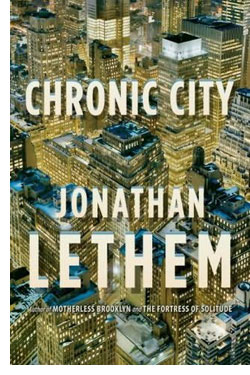 |
 |

Jonathan Lethem
Chronic City
Doubleday / Random House
US Hardcover First Edition
ISBN 978-0-385-51863-5
Publication Date: 10-13-2009
480 Pages; $26.95
Date Reviewed: 10-23-2009
Date Remixed: 12-25-2011
Reviewed by: Rick Kleffel © 2011
Index:
General Fiction
Science Fiction
How many love letters can Jonathan Lethem write to Manhattan? And how different will each of them be? His newest novel, 'Chronic City,' is more likely to elicit questions than answers. But they're the kind of questions that readers love, the kind of questions that keep us reading. And Lethem is uniquely talented in this department. He'll get a regiment of angels to dance on a pinhead and only when we as readers have recovered from the sheer joy of his skill do we realize that all the whys and wherefores we ask the writer are more fruitfully directed at the readers — our own bad selves.
Back a while, when the world was young and wooly mammoths roamed the American tundra, an upstart young Lethem wrote his heart out with 'The Fortress of Solitude,' a powerful nostalgic and evocative look at his youth in Brooklyn and beyond. The novel existed in a moonshine shimmer of unreality, in which light it brought to life the soul of the writer — or at least one side of what is proving to be a very complicated man. 'Chronic City' finds Lethem back in New York, in a sort-of near future and in a much more antic mood. While 'The Fortress of Solitude' gave us a boy growing into a young man, 'Chronic City' gives us a young man who is still a boy at heart.
From the get-go things take on an odd combination of mundanely realistic and surreally inventive — in the opening pages. First we get these names; our protagonist is one-time child star Chase Insteadman, and he rapidly meets Perkus Tooth. What the heck? But wait, it gets better and better. Chase's fiancée is trapped in the International Space Station; and that's the realistic portion of the narrative. No, what will get you going is Lethem's ruthless inventiveness, because the question this book asks, and the questions you're going to be asking yourself very, very soon is an essential tool for living. What is real?
Lethem has a ball in this novel, with a non-stop assault of dry humor as he tells lies that sound like the truth and truths that sound like outrageous fabrications. He employs a very light touch here, and as well a sort of heavy-handed sense of the imagination that is really fun. Everything is happening at once in Lethem's literary Manhattan; it is truly a city of synchronicity and chronicity. Chase finds himself aswirl in events that seem to be meaningfully connected. And there is meaning to be found in all that chronicity, which I'll define as simply as events passing at the same time, related or not. The trick is to start asking the right questions. Once you get that down, the right answers will follow. The problem is that synchronicity can lead you ask the wrong questions, with results that do not swell your bank account, your sense of personal worth and satisfaction or alarmingly, your life expectancy.
One of the most interesting questions to be asked is quite simple; who is telling the story? Lethem gives us Chase Insteadman as a protagonist, and he's the written voice, but this is clearly a bit of literary ventriloquism by Lethem himself as he looks back on his own life. Readers can and should triangulate this work with 'The Fortress of Solitude,' a work at once more magical and more somber than 'Chronic City,' to get the full effect. Throw in a dash of his non-fiction and you get the written equivalent of three-d.
This is Jonathan Lethem where, to my mind, his most ardent readers most enjoy him. He's at play in the fields of The Man, off on a lark where reality, the present and future fall together and apart at the same time. It's wave-particle literature, science fiction one second, literary humor the next. Here's where the Heisenberg principle gets a literary application, since the work itself, the 'Chronic City,' changes every time we ask it another question — and realize those questions are best directed at ourselves.
|
 |
|
|
 |
| |
Review Archive
All Reviews alphabetized by author.
General Fiction
Non-Genre, general fiction and literature.
Horror
Supernatural fiction, supernatural horror and non-supernatural horror.
Science Fiction
Science fiction, science fantasy, speculative fiction, alternate history.
Fantasy
Fantasy, surrealism and magic realism.
Mystery
Crime, thrillers, mystery, suspense.
Non-Fiction
Non-Fiction, True Crime, Forteana, Reference.
Poetry
|
|
 |
|




